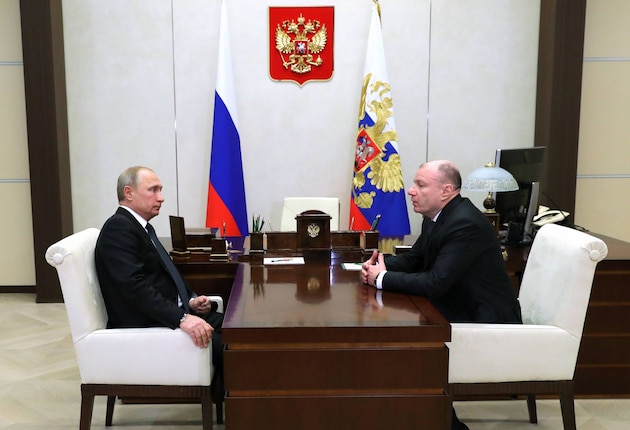Western sanctions are intended to weaken the Russian economy and elite. But Russia’s economy is doing better than expected: Individual players and sectors are even benefiting from the war and the sanctions imposed.
In response to the Russian invasion of Ukraine, the EU has imposed a series of sanctions on Russia. These aim to massively weaken Russia’s economy and political elite. But the Russian economy is doing better than assumed by the West.
Because individual actors and entire industries even benefit from war and imposed sanctions. After all, not all companies and sectors are on the Western sanctions lists. By buying assets cheaply, some companies have even been able to expand their empires.
One of the beneficiaries is Vladimir Potanin: the second-richest Russian is only on the sanctions list in some countries and is making big profits from the Putin regime. Potanin, 62, was Russia’s deputy prime minister in the 1990s and is now making billions as an entrepreneur. According to Forbes magazine, he is the second richest man in Russia with a fortune of more than $26 billion.
Potanin is a co-owner of the Russian mining concern “Nornickel” and since this year the owner of the bank Rosbank. Because he has close ties to Russian President Vladimir Putin, some countries are sanctioning him. Right at the beginning of the Russian war of aggression in Ukraine, Canada put Potanin on the sanctions list – Australia and Great Britain also followed suit.
The United States finally put the Putin friend and his family on the US sanctions list in mid-December. But no sanctions were imposed on the mining company “Nornickel”, reports Bloomberg journalist Annmarie Hordern to ntv.
The company plays a role in keeping the metals market stable: Potanin’s company accounts for 38 percent of the world’s palladium, 17 percent of the nickel and 10 percent of the platinum market. This is also the reason why European Union sanctions leave Potanin and his empire completely unaffected.
And this benefits the multi-billionaire: in the first months after the war began, he began buying up assets cheaply, since other companies, unlike Potanin, were affected by the sanctions. “World” reports on this.
One of his purchases is Russia’s second largest Tinkoff bank – Potanin also bought Russia’s eleventh largest bank Rosbank. In this way he was able to expand his empire at reasonable prices through the war.
He is not the only one: Many Russians bought companies at least half cheaper, reports economist Oleg Vjugin, former deputy head of the Russian central bank and chairman of the supervisory board of the Moscow stock exchange, to “Welt”.
So does the fast food chain McDonalds: In June 2022, McDonalds sold its Russian branches with 62,000 employees to long-term partner Alexander Gowor. With a new logo and under the name “Lecker und Punkt” the business is now going on. However, McDonald’s left a loophole in the sale: a buyback option at market terms over the next 15 years.
But Vjugin tells the world that the most lucrative deals have been in manufacturing. Modern technology companies worth hundreds of millions of euros were bought for tens of millions, explains Vjugin.
In addition to the company takeovers, some sectors in Russia have also experienced large growth as a result of the Ukraine war – including the logistics sector. At the beginning of the Ukraine war, Russian air traffic, seaports and overland transport of goods were severely affected by western sanctions.
But now more and more new logistics companies are appearing to occupy new routes in import and export. Dubai, Turkey and some Eastern European countries are teeming with new logistics companies – a win for the Russians and their international partners.
And the Russian armaments industry is said to have grown significantly, according to “Welt” information. Weapons manufacturers are said to be working at full capacity to meet the huge demand. Thus the Russian armaments industry became the pillar of the Russian economy.
While the Russian banking sector was negative overall, individual banks were able to benefit from the crisis. Some unsanctioned financial institutions were able to generate growth because most of the other banks were already under sanctions. In this way, Raiffeisenbank International has attained a special status and increased its net profit.
The Killer in the Kremlin: Intrigue, Murder, War – Vladimir Putin’s ruthless rise and his vision of a Great Russian Empire
The Western energy crisis also benefited Russia in 2022: Due to the sharp drop in exports and higher prices, Russians were able to earn more last year than the year before. But the prospects for the future are rather bleak: The International Energy Agency believes that gas and oil production will be up to 20 percent below the level before the start of the Ukraine war due to the sanctions.
While some companies and industries have benefited from the sanctions and aftermath of the war, Russia is unlikely to experience further growth in 2023.








